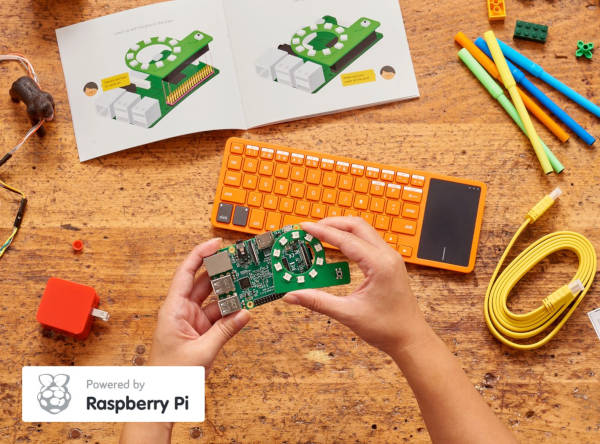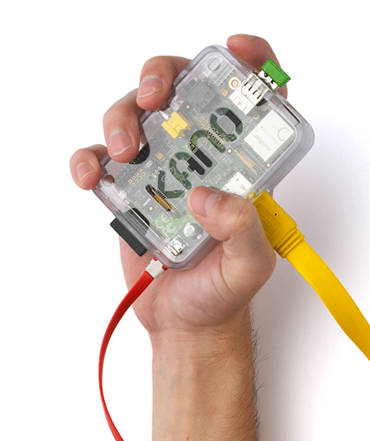| Is This What It Now Means To Build A Computer? |
| Written by Harry Fairhead | |||
| Thursday, 11 April 2019 | |||
|
When I was young, building a computer was taken to mean soldering chips into place and low-level debugging. Now it seems to mean putting a prebuilt computer into a box. Yes this is another "what is wrong with the kids today" diatribe - another grumpy old man's reflections on how it all went wrong. A remarkably short time ago, if you wanted a computer then you had to build it - it really wasn't an option. Well you could also sometimes pay for someone else to build it for you, but this was considered to be missing most of the fun and anyway who had so much cash that they would willing pay someone to do the work. You might find my emphasis on cost a unlikely. Was I poor? No but I was paying something like $1000 in today's money for something that might well have no real use. Would you put your money on a 4KByte, 8-bit machine running at 1MHz with nothing but an unreliable audio cassette for storage, doing anything useful? Computer kits would come with lots of instructions, lots of chips and a reel of solder. You were expected to put the chips into place on the PCB and solder everything up. Then you had to test the finished assembly which usually then involved looking for places you had made a mess of the PCB by creating a solder bridge between two pins or tracks. For example, a 4K memory board would have at least 32 chips and lots and lots of possible places where tracks were so close that bridging with solder was almost a certainty. It not only taught you how to use solder wick or if you could afford it a solder sucker it taught you how to use a memory diagnostic to find stuck and joined address lines. This closeness to the hardware really made you understand what was going on. Yes, you were just assembling a PCB but you had to look at the schematic diagram to discover how to do it and getting it to work was a lot easier when you understood how it all worked. In short, it was a great introduction to computer hardware and from there the lower level software. When you switched it on all you generally got was a prompt from the code in the EPROM. You really did have to understand the hardware and the way the software made use of it to even begin using the machine. As a result many also designed their own add-on boards or modified existing ones. The bottom line was that building a computer from a kit taught you enough to build one of your own design from scratch if needs be. What started this nostalgic recollection of times past was an encounter with Kano. If you haven't heard about Kano then I need to explain that it was a phenomenally successful Kickstarter project to create a kit that lets you build a computer. This is a really great idea, and despite my musings about how things used to be, it did deserve the support it got and its new range of products is impressive but... Kano is based in turn on the phenomenally successful Raspberry Pi computer. It takes a RPi and puts it in a box along with a case, an add on LED ring light and some educational material. Packaging a RPi to make it easier for very small people or the very lazy to get started is a good idea and now we get to the "but...". The promotional material goes a long way to establishing the idea that this is building a computer. For example, the promo video below is titled "Make a computer. Learn to code. Play." Is this aiming low in hardware terms? OK, I know that once the computer is built, sorry connected and switched on, the true learning begins, but Is connecting some cables "building a computer"? Something has gone really wrong somewhere. You might now be thinking what alternative is there? First off I think my real objection is the way Kano makes more of the activity of plugging in some cables than it deserves. It really does get small children interested in computing at an age where building a computer in any other sense isn't a possibility and for that I applaud Kano and if you have small children or know of some then go and buy a Kano kit - you wont regret it. I can see that this early experience might fall on its face however without a sufficiently computer savvy grup to provide some guidance. My guess is a lot of the early encounters with such computer building ends up as a distorted memory best summarized as: "do you remember that time you built a computer - you were only ten....Such a genius." Most worthwhile things in life are hard and you have to do some work to get the reward. The Kano package, or just the RPi, has the potential to challenge the user, but mostly with software rather than its hardware content. This is educational but building a computer it isn't - that's what the people at Raspberry Pi have done for you. Their latest product - a Harry Potter Coding Kit - complete with wand is some what more honest in the sense that you really do know before you begin a that you haven't really "built" a magic wand: Fun though! To pick on another easy target - TV shows. A recent crime drama I watched had me fuming when they pulled out an old computer case and one of the main characters confessed to "having built a computer" as a teenager. The scene involved some dubious poking around with disk drive cables and that was about it. This is exactly the same as the Kano "build". The motherboard is a complete computer - adding some disk drives and perhaps plugging in some memory. For far more years than Kano, people have referred to the moderately low-skill task of plugging some modules together as "making a computer". Gamers are particular prone to this and even credit their computer building skills with adding flashing fans and LED strewn. There is a technical content to the activity, but it is knowing what is fast and what works with what. It is more like picking the optional extras for your next car. Building a computer it isn't. OK - I admit I'm being provocatively hardline here and none of the above is bad and it's all better than being cyberdumb, but building a computer it is not. I doubt that we can ever get back to the "good old days" of soldering LSI and TTL logic gates to make something work. If you really want to then I can recommend Nand to Tetris, which is still available as a self-paced course on the Coursera platform and is taught at many universities. It is worth the trip but not everyone needs to or is capable of taking it. I'm not saying that we should stop custom configuring modules - just that we should stop calling it "building a computer" After discovering that software generally didn't involve burnt fingers and damaged components, I personally was completely won over. Software is great and I don't miss the smell of solder in the morning - well OK I do a little. I think that the emphasis on "physical computing" is great but the few transistors and modules that we hang on the outside of something like a Raspberry Pi is insignificant compared to the huge complexity and number of transistors in the Pi itself. Credit where credit is due and let us be clear that the real computer builders are the designers working at Intel, ARM and similar...
More InformationRelated ArticlesRaspberry Pi or Programming - What shall we teach the children? Getting Started With Digital Logic - Logic Gates Learn By Building Your Own Computer
To be informed about new articles on I Programmer, sign up for our weekly newsletter, subscribe to the RSS feed and follow us on Facebook or Linkedin.
Comments
or email your comment to: comments@i-programmer.info <ASIN:1871962609><ASIN:1871962463> |
|||
| Last Updated ( Thursday, 11 April 2019 ) |




